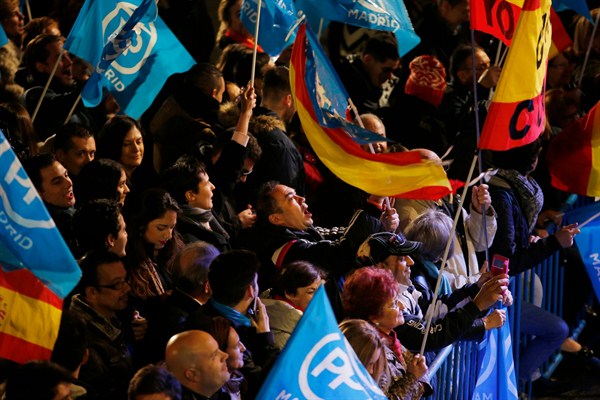When Spain went to the polls last December, the outcome sent the country into a state of political limbo. Neither the incumbent conservative Popular Party (PP) nor the main opposition party, the social-democratic Spanish Socialist Workers’ Party (PSOE), captured the majority of seats necessary to form a new government in the Congress of Deputies, Spain’s parliament. The PP won 28.7 percent of votes; the PSOE won 22 percent. At the same time, two political newcomers, bolstered by the economic crisis that has gripped Spain since 2011, managed to capture a third of all votes cast. The resulting 20 percent for the leftist Podemos, which translates to the Obama-esque “We Can,” and 13 percent for the center-right Cuidadanos, or Citizens, compounded the complexity of putting together a coalition government.
Two scenarios loom on the horizon for Spanish politics. The first is the formation of a grand right-left coalition that encompasses the PP, PSOE and Ciudadanos. The model for such a configuration would be Germany’s current government, which incorporates former rivals the Christian Democrats and Social Democrats. But a long history of bitter PSOE-PP relations and the mutual dislike between PP leader Mariano Rajoy, Spain’s prime minister, and his PSOE counterpart, Pedro Sanchez, have undermined the chances of such a coalition. PSOE leaders are also wary that allying with the PP would tie the party to the latter’s legacy of corruption. “To negotiate with the PP would be to forgive,” said the PSOE’s party secretary, Cesar Luena, referring to the web of corruption scandals engulfing the PP as a hurdle to a PP-PSOE governing coalition.
A more realistic scenario is a left-wing “coalition of the losers,” similar to the current Portuguese government, that would bring together the PSOE, Podemos and Izquierda Unida (United Left), a federation of small, left-wing parties led by the Spanish Communist Party. Last November, following similarly inconclusive elections in Portugal, that country’s center-right minority government was toppled from power barely 10 days after it was sworn in and replaced with a coalition of left-wing parties, including the Socialist and Communist parties and an assortment of far-left parties—all of whom had finished behind the center-right Portugal Ahead party in the elections.

